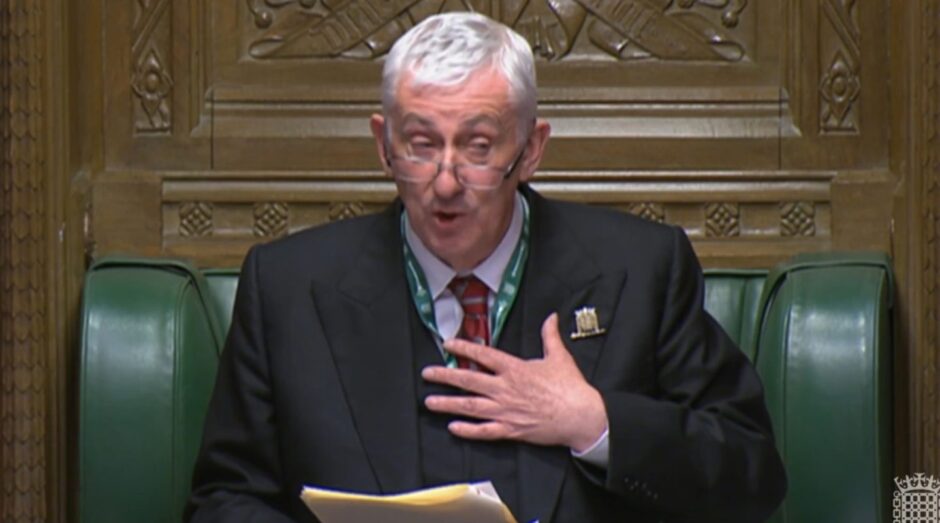The SNP’s House of Commons motion calling for an immediate ceasefire in Gaza was both bleakly cynical and entirely legitimate.
It was cynical because, really, it had nothing to do with peace in the Middle East and everything to do with embarrassing Labour leader Sir Keir Starmer.
The SNP’s opposition day motion was worded in such a way as to make it impossible for the leader of the opposition to sign.
The nationalists’ criticism of “the collective punishment” of Palestinians by Israel amounted to an accusation of war crimes.
Starmer is likely to be Prime Minister within months and with that role will come serious international responsibilities. Of course he could not – even if he agreed with the sentiment – put his name to such a provocative motion.
The Nats, recognising the difficulty of Starmer’s position, used allocated parliamentary time to bring forward a motion that he could not sign so that they could then criticise him for failing to back their call for a ceasefire. The SNP’s sole objective was to create some basis for the accusation that Starmer is pro-war in the Middle East and that he cares nothing for the lives of Palestinians.
Grubby as all that may be, the SNP’s wheeze was entirely permissible.
House of Commons convention allows opposition parties to bring forward whatever motions they please. Cynicism is no barrier to this process. If the SNP wishes to use its time in a cynical bid to make trouble for Keir Starmer then it is free to do so. In a democracy, this is as it should be.
Things took a turn
Things took a turn at Westminster on Wednesday when, in contravention of the convention, the Speaker of the House of Commons, Sir Lindsay Hoyle, allowed a vote on a Labour motion on the matter.
Cue apoplexy from SNP and Tory MPs, alike.
Hoyle was variously accused of willingly conniving with Labour to protect Starmer, of being bullied into acting under threat that he might be removed as speaker, and – at best – of behaving with remarkable naivety.
Hoyle’s version of events – that, given the sensitive nature of the issue and the implications for MPs of how they voted, he wanted to give as many people as possible the opportunity to make their positions clear, did nothing to head off calls for him to go. Support for a vote of no confidence in Hoyle grew throughout Thursday.
I’m not entirely sure SNP Westminster leader Stephen Flynn has called this one right. Labour’s motion may have avoided the nationalists’ language on “collective punishment” but it did call for an immediate ceasefire.
That marked a substantial change in position for Starmer and there was an opportunity for Flynn to claim he’d forced the Labour leader’s rethink.
Instead, Flynn urged about the SNP being victims of a stitch-up.
Well, perhaps, but surely if the SNP’s position genuinely is that it wants maximum support for calls for an immediate ceasefire in Gaza then Labour’s position was to be welcomed, wasn’t it?
Senior SNP figures are furious not that Labour’s motion got a hearing but that their motion, designed to embarrass Sir Keir Starmer, was scuppered.
The matter of conflict in the Middle East is incredibly sensitive, so much so that it is liable to provoke extreme reactions from some quarters.
Surely members of all parties have a responsibility not to inflame public anger
Across a number of recent protests, we have seen the anger of pro-Palestinian marchers directed towards politicians. This being so, surely members of all parties have a responsibility not to try to inflame or exploit public anger?
The SNP’s attempt to stitch up Starmer showed the nationalists willing to play games on dangerous territory.
Despite a full apology for the chaotic scenes that erupted in the House of Commons on Wednesday, Hoyle has not yet fended off demands for him to go.
Those currently threatening to oust him are playing a risky game. Say they do get rid of him, how will they ensure their preferred replacement isn’t swept out of office by Labour after the next general election?
Nobody would deny that the matter of conflict in the Middle East is a legitimate matter upon which MPs to opine.
But this is a serious matter, deserving of serious consideration and thoughtful debate, not a throwaway subject to be used in a cheap game of point-scoring.
The SNP is entitled to be angry about what happened on Wednesday. Others are entitled to reckon the party was beaten at its own tawdry game.
Euan McColm is a regular columnist for various Scottish newspapers


Conversation